| |
 |
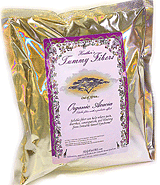
Organic Acacia
Soluble Fiber
The prebiotic fiber that reduces bloating & gas!

In this Issue...
Food & Recipes
Special Events
Rx News & Research
Ask Heather ~ Pregnancy, Menopause, & IBS
About Us
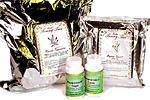
The Herb Kit - 20% Off!
Peppermint and Fennel Tummy Teas
plus Peppermint Caps!
All the herbal help you need to start managing symptoms RIGHT NOW!
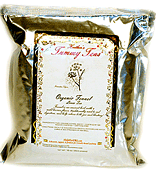
Fennel Tummy Tea for Bloating & Gas
Fennel has anti-spasmodic properties and I think it's the best for relieving bloating and gas!
Our one-pound bag equals more than ten boxes of tea bags, and has a high volatile oil content for a super strong and effective brew.
Did you miss the latest
IBS newsletter and
Smoky Sweet Potato Soup?
Past issues
are posted here!
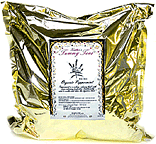
Heather's
Peppermint Tummy Tea
Peppermint is a smooth muscle relaxant and has pain-killing properties.
Our tea is very large leaf with a very high volatile oil content - so much stronger than tea bags you won't believe it!
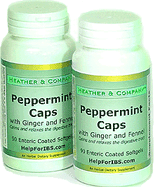
Peppermint Oil Caps Are Amazing!
I think Peppermint Oil Caps are truly unbeatable for abdominal spasms, cramps and pain.
Our caps also have fennel and ginger oils, for extra digestive benefits!
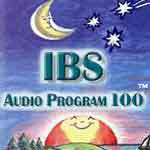
Gut-directed hypnosis is one of the most effective ways to help relieve all IBS symptoms! Results can last more than 5 years.

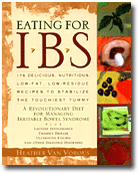
Delicious Recipes
for IBS!
Learn how to eat well and feel better!
|
 |
|
| |

Did your email mangle this newsletter? Copy and paste this address into your browser window:
http://www.helpforibs.com/news/newsletter/apple102704.html or go here to see it online.
October 27, 2004
This week - Pregnancy, hormones, and IBS
Hello to everyone -
We're back from the very first annual IBS Fall Sprawl in Las Vegas! We had a terrific turn-out of wonderful folks from the IBS Boards, and I think it's safe to say that everyone had a great time. In between all of the crazy nighttime Vegas fun and adventures, we had an IBS meet-and-greet with loads of free samples of IBS products for everyone, fabulous IBS-friendly cakes and herbal teas, and a very interesting, enlightening day-long IBS question and answer session.
It was really a delight to meet so many folks in such a fun and social atmosphere, hear everyone's IBS stories, share experiences and knowledge, and (most importantly) laugh so hard at ourselves and all that we've gone through. I'd like to give my eternal thanks and enormous hugs to our Vegas coordinators, Kandee, Jennifer Rose, Mags, and Shell Marr. None of this would have happend without them - and they are already starting to plan next year's IBS Sprawl. You guys are the greatest! To see pictures from this year's Sprawl, and get a jump on joining us for next year's event, drop on by the Las Vegas board.
If you missed our last newsletter's special announcement, the 2004 harvests of peppermint and fennel have arrived! This means that both the Peppermint and Fennel organic Tummy Teas™ are at their all-time freshest and strongest - you won't believe how potent these teas really are until you try them. Come see what you think!
As always, we also have a wealth of new digestive health research findings. Enjoy!
Best Wishes,
Heather Van Vorous
Did a friend send you this newsletter? Sign up here for your own free subscription.

Homemade Applesauce
Apples are coming into peak season right now, and nothing is more delicious for autumn than freshly made applesauce! This is one recipe that is so incredibly easy and fast to make you'll wonder why you ever used to buy bottled applesauce. Homemade applesauce is a wonderful high soluble snack to have on hand, it's perfect with toast, hot cereal, or buttermilk pancakes for breakfast, and a great baking staple that can replace much of the oil used in quick breads like Peppermint Fudge Cake.
Feel free to use whatever apples you like best for this recipe - my personal favorite is very tart, green Granny Smiths, which give a delicious sweet-tangy result. But any kind of apples, red or green, will work beautifully.
Makes 2 Servings (easily doubled or tripled)
2 apples, peeled, cored, and chopped
Put the apples in a small saucepan and add just enough water to barely cover the bottom. Cover pot and cook over low-medium, stirring occasionally, until apples disintegrate, about 20-30 minutes. That's all there is to it!
For oodles of other delicious recipes, come visit the IBS Recipe Exchange board!
Are you just learning how to eat for IBS? A little intimidated at the thought of special IBS recipes? Not quite sure just what makes these recipes special in the first place? Don't worry! Come see
the IBS Diet pages, and find the answers to all your questions.
 Meet Our New IBS Board Moderator, and Send Her Your Picture!
Meet Our New IBS Board Moderator, and Send Her Your Picture!
I am thrilled to announce that the IBS Recipe Board has a new moderator - the totally fabulous Casey! You might know her by her board name, Atomic Rose, and if you're a regular on the boards you are sure to know her by the terrific advice she's been giving for quite some time now. Casey
has also volunteered to post new people's photos on the boards (thanks, Casey!) So, if you're a board member who's always wondered how everyone else got their pictures to appear, or if you've emailed me your photo in the past but it hasn't yet shown up on the boards, please send your photo to Casey at ibsboard@gmail.com and she will make the magic happen.
 New Media Campaign for IBS-Constipation Drug Zelnorm
New Media Campaign for IBS-Constipation Drug Zelnorm
Novartis Pharmaceuticals, the drug company that manufactures Zelnorm, has announced a new IBS- Constipation awareness campaign led by actress Cybill Shepherd. The Amazing Women campaign is designed to empower women to see their doctor for proper diagnosis and treatment of recurring constipation accompanied by abdominal pain or discomfort and bloating, the hallmark symptoms of IBS-Constipation. Zelnorm is a prescription drug meant for short-term use by women with IBS-Constipation; it imitates the action of serotonin (a neurotransmitter) in the gut, and should NOT be used by women with IBS-Diarrhea or by men.
Go here for more
information about Zelnorm...
Diet May Influence Relapse in Ulcerative Colitis
Potentially modifiable dietary factors, such as high meat or alcoholic beverage intake, may increase the likelihood of relapse for patients with ulcerative colitis (UC), according to the results of a prospective cohort study published in the September issue of Gut.
Go here for more
information...
Health-Promoting Compounds Found in Honey
Health-promoting compounds found in honey could make this ingredient a more attractive option for food makers currently using bulk sweeteners such as high-fructose corn syrup. Researchers at the University of Illinois at Urbana-Champaign say that honey may be a healthier alternative to corn syrup due to its higher level of antioxidants, compounds which are believed to fight cancer, heart disease and other diseases.
Go here for more
information...
Soy is Unlikely to Damage Fertility in Women
Soy is unlikely to damage fertility in women, report researchers at the annual meeting of the American Society for Reproductive Medicine in Philadelphia, who investigated the theory that its positive impact on breast cancer risk may have other, unwanted effects. Their study also offers insight into how the plant food impacts breast cancer risk. Women in Asian countries where a lot of soy is consumed have dramatically lower rates of breast cancer than women in the United States and Europe. Isoflavones, a kind of plant estrogen found in soy, are thought to be play a role in this lower incidence, either by increasing menstrual cycle length or reducing ovarian hormones – both of which would reduce lifetime exposure to estrogen.
Go here for more
information...
Stress Therapy Can Help Irritable Bowel
Tense, tired, depressed: For people with irritable bowel syndrome (IBS), dealing with their disease takes a mental and physical toll. Emotional state and energy level -- not just bowel problems -- need a doctor's attention, a new study shows. Many doctors do a poor job of addressing their patients' fears and concerns and understanding how quality of life is affected, writes lead researcher Brennan M.R. Spiegel, MD, MSHS, a gastroenterologist with The David Geffen School of Medicine at UCLA and the VA Greater Los Angeles Healthcare System. His paper appears in the latest Archives of Internal Medicine. "There's a disconnect between how patients and doctors view the disease," Spiegel tells WebMD. "Doctors are trained to think about bowel movements -- their frequency, their color, texture. But this study shows that our patients feel we are underestimating the severity of the effect on their quality of life."
Go here for more
information...
Obesity is Associated With Increased Risk of GI Symptoms
Perception of sensations arising from the gastrointestinal tract may be diminished in obese subjects and thus facilitate overeating. Alternatively, excess food intake may cause gastrointestinal (GI) symptoms in obese patients. This Medscape Gastroenterology study evaluated the relationship between body mass index (BMI) and specific GI symptoms in the community.
Go here for more
information...
Looking for the latest IBS research and news?
Check out the IBS Research Library!
 Pregnancy, Menopause, Hormones, & IBS
Pregnancy, Menopause, Hormones, & IBS
"Do hormones play a role in IBS? If I have IBS, will pregnancy make it worse or better? What about menopause?" ~ Julia Bowen, Brighton, UK
While most women with IBS have long suspected that hormones have an impact on their IBS symptoms, research has recently shown just how dramatic and wide-ranging this link is. Women have a higher prevalence of IBS than men in the first place, which may actually be due to sex-related differences in brain responses to visceral (body) and psychological (mind) stressors, as well as hormonal influences. Women with IBS have more severe symptoms and need more medications than men. Small-bowel transit, gastric emptying, and colonic transit times are all significantly different for women (even women without IBS) than for men. and hormones are believed to play a large role here. There are also estrogen receptors in the stomach and small intestine, which react to changing levels of hormones.
Most women with IBS quickly learn through experience that menstruation leads to a worsening of their abdominal pain and bloating, and increased bouts of diarrhea as well. This is often due to the high progesterone levels that trigger the uterine cramping of menstruation, which can also cause gastrointestinal muscle spasms. Studies actually show that three-quarters of women with IBS say their symptoms are worse during menses. For many women, taking steps to prevent or relieve menstrual cramps can help prevent period-related IBS symptoms as well; regular exercise, abdominal hot packs, and herbal teas with smooth muscle relaxant properties (peppermint, fennel, chamomile, raspberry leaf) are all healthy approaches to take. Personally, I've had spectacular results reducing menstrual cramps (and completely eliminating cramp-related IBS flares!) from practicing yoga. For some women, birth control pills can lessen menstrual symptoms and associated IBS flares - this is an issue to address with both your GI doc and your ob/gyn.
While research has acknowledged that pregnancy can have a significant impact on IBS, there is no consensus as to what that impact will be. The extreme hormonal fluctuations of pregnancy often trigger GI distress in women who do not even IBS; for those who have a dysfunctional gut to begin with, predicting whether IBS will worsen or improve during pregnancy is a bit of a crapshoot. It's not uncommon for pregnant women to feel that their IBS has completely gone into remission, but the flip side of the coin is that other women may feel that pregnancy makes their IBS worse than it has ever been before. Or, the severity of IBS symptoms may stay the same while the symptoms themselves change - someone who is normally diarrhea-predominant will suddenly find themselves dealing with constipation, or vice versa. Gas and bloating may worsen one month while abdominal cramps disappear, but the next month will see just the opposite happen.
This inconsistency can happen not just within the term of a single pregnancy, but women can also have dramatically different experiences with their IBS from one pregnacy to another. Unfortunately, I don't know of any way for a woman to predict what exactly will happen with each pregnancy of her own, nor have I seen any research that specifically addresses this issue. If you're pregnant or considering a pregnancy, it can be very helpful to start discussing the issue with other women who have already dealt with IBS and pregnancy on the IBS Message Board. Our terrific moderator Han Solo has a special interest (and personal experience) in IBS during pregnancy, and has posted a wealth of helpful suggestions on the boards. This is also an issue to discuss with your doctors.
In general, medical studies of IBS during pregnancy recommend conservative treatment, including dietary changes, soluble fiber suplements, exercise, and biofeedback. I would add gut-directed hypnosis to the list of safe and effective (not to mention enjoyable) means of treating IBS during pregnancy as well. For a note of reassurance here, remember that pregnancy seems just as likely to affect IBS for the better and not automatically for the worse. Also keep in mind that, to my knowledge, there is no evidence at all that IBS has any effect whatsoever on a woman's ability to conceive and carry a full-term, healthy pregnancy with normal delivery. I don't know of any reason why IBS should compromise your wish to have children - and your own ob/gyn should be able to address all of your concerns here.
The research on IBS and menopause is fortunately both more clear and more clearly optimistic. Studies have shown that the drop in hormones after menopause results in reduced severity of IBS symptoms; after age 50, the severity of IBS symptoms in women and men is identical. Women in postmenopausal age groups have significantly less severity overall for IBS abdominal pain, bloating, and have higher quality of life scores compared to younger women with IBS. The theory that the drop in hormones from menopause directly correlates with improved IBS symptoms is further supported by studies finding that hormone replacement therapy in menopause is associated with an increased risk of IBS flares.
So, while hormones and gender do play a significant role in IBS (possibly the development of the disorder as well as the severity and frequency of symptoms), it's not all bad news. IBS flares from menstruation can be well-managed with healthy lifestyle adjustments. Pregnancy seems to be at least as likely to improve symptoms instead of worsen them, and if pregnancy does trigger more IBS attacks there is nothing to show that this won't completely subside after childbirth. Menopause is clearly linked to significant improvements in IBS across the board.
All hormonal fluctuations that affect IBS for the worse are typically temporary, with no serious or permanent health consequences to be concerned about. As is the case with so many other elements that affect IBS, arming yourself with as much knowledge as possible is one of the very best ways to manage your symptoms from the outset. You can successfully control your IBS - it does not have to control you. To read through a wealth of research findings on hormones, pregnancy, and menopause in IBS, including all of the studies referred to in this column, go to the gender section of the IBS Research Library.
Coming soon, we'll address how dietary fat consumption directly affects both hormones and IBS - and why this means your diet should be low fat, and high in essential fatty acids, but NOT fat free.
One of the most popular previous IBS Newsletter columns was the Seven Sneaky Deadly Sins of the IBS Diet. Wondering what they all are? Check here...
1. Coffee (yes, decaf counts)
2. Yogurt (it's the safest dairy product for IBS...isn't it?)
3. Alcohol (just one glass of wine is okay, right?)
4. Vitamin supplements (they're good for you, aren't they?)
5. No insoluble fiber foods (they're triggers, so you just don't eat them, right?)
6. Too low a dosage of soluble fiber supplements
7. Not drinking enough water (doesn't soda pop count?)
 Heather & Company for IBS, LLC is dedicated to serving people with Irritable Bowel Syndrome. Our mission is to provide education, support, and products that allow people with IBS to successfully manage their symptoms through lifestyle modifications.
Heather & Company for IBS, LLC is dedicated to serving people with Irritable Bowel Syndrome. Our mission is to provide education, support, and products that allow people with IBS to successfully manage their symptoms through lifestyle modifications.
We offer extensive information and tangible help for IBS, including the world's best-selling and best-reviewed books for the disorder. We provide the internet's top IBS web site resources; a twice-monthly IBS Newsletter; seminars and classes; dietary brochures for patient distribution by health care professionals; an IBS Research Library; and Heather Cooks!, a healthy cooking show on Seattle television. Much of our work is based on Heather's development of the first and only comprehensive IBS dietary guidelines and recipes, an achievement which has earned numerous awards and accolades as well as thousands of thank you letters from IBS sufferers.
Heather & Company also provides the only patient-expert moderated IBS Message Boards on the internet with forums for diet, recipes, hypnotherapy, yoga, plus Crohn's and Colitis. In addition, we support and coordinate the formation and continuation of local in-person IBS support groups across the USA, Canada, the UK, Australia, and New Zealand. We will soon have other IBS services and products available.
Our website receives over 2.5 million visits each year, and our newsletter is sent to over 25,000 people. We are regular exhibitors at the Digestive Disease Week and American Dietetic Association conferences.
Sponsorship opportunities are available for the message boards and this newsletter for companies and/or products that have been legitimately established as helpful for digestive disorders.
Please contact us for information.

You are receiving this email because you have expressed interest in IBS news and information.
To unsubscribe from Heather's IBS Newsletter, go here http://www.helpforibs.com/news/unsub.asp or send an email to help@helpforibs.com.
Change your newsletter email address here.
If you are viewing this newsletter on a website and would like to subscribe for email delivery, please "Join the IBS Newsletter" here.
ANTI-SPAM PRIVACY & SECURITY POLICY
LEGAL DISCLAIMER - This email is not intended to replace the services of a physician, nor does it constitute a doctor-patient relationship. Any application of the recommendations in this email is at the reader's discretion. Heather Van Vorous and Heather & Company for IBS, LLC are not liable for any direct or indirect claim, loss or damage resulting from use of this email and/or any web site(s) linked to/from it. Readers should consult their own physicians concerning the recommendations in this email.
HelpForIBS.com
Heather & Company for IBS, LLC
80 S. Washington St, #304
Seattle, WA 98104 USA
© 2004 Heather & Company for IBS, LLC. All rights reserved.
|
|
|
|